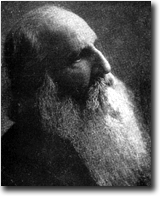A Quote by Samuel Johnson
In civilized society external advantages make us more respected. A man with a good coat upon his back meets with a better reception than he who has a bad one. You may analyze this and say, What is there in it? But that will avail you nothing, for it is a part of a general system.
Related Quotes
The legislator commands the future; to be feeble will avail him nothing: it is for him to will what is good and to perpetuate it; to make man what he desires to be: for the laws, working upon the social body, which is inert in itself, can produce either virtue or crime, civilized customs or savagery.
It seems to be a general belief that the will of God is to make things distasteful for us, like taking bad-tasting medicine when we are sick, or going to the dentist. Somebody needs to tell us that the sunrise is also God's will. There is the time of harvest, the harvest which will provide food and clothes for us, without which life could not be sustained on earth. God ordered the seasons-they are his will. In fact, the good things in life far outweigh the bad. There are more sunrises than cyclones.
It is true that water will flow indifferently to east and west, but will it flow equally well up and down? Human nature is disposed toward goodness, just as water tends to flow downwards. There is no water but flows downwards, and no man but shows his tendency to be good. Now, by striking water hard, you may splash it higher than your forehead, and by damming it, you may make it go uphill. But, is that the nature of water? It is external force that causes it to do so. Likewise, if a man is made to do what is not good, his nature is being similarly forced.
If idioms are more to be born than to be selected, then the things of life and human nature that a man has grown up with--(not that one man's experience is better than another's, but that it is 'his.')--may give him something better in his substance and manner than an over-long period of superimposed idiomatic education which quite likely doesn't fit his constitution. My father used to say, 'If a poet knows more about a horse than he does about heaven, he might better stick to the horse, and some day the horse may carry him into heaven'
If I am recalling an incident very vividly I go back to the instant of its occurrence; I become absent minded, as you say. I jump back for a moment. Of course we have no means of staying back for any length of time any more than a savage or an animal has of staying six feet above the ground. But a civilized man is better off than the savage in this respect. He can go up against gravitation in a balloon, and why should we not hope that ultimately he may be able to stop or accelerate his drift along the Time Dimension; or even to turn about and travel the other way?
Nothing is more unjust, however common, than to charge with hypocrisy him that expresses zeal for those virtues which he neglects to practice; since he may be sincerely convinced of the advantages of conquering his passions without having yet obtained the victory as a man may be confident of the advantages of a voyage or a journey, without having courage or industry to undertake it, and may honestly recommend to others those attempts which he neglects himself.
It is alone that part of the external universe which we call material which acts on man through his senses - that part of which we ordinarily feel our knowledge to be the surest; but in reality, strangely enough, as will soon appear, this is one of the aspects of the external world, of which we can know nothing.
A successful poem says what a poet wants to say, and more, with particular finality. The remarks he makes about his poems are incidental when the poem is good, or embarrassing or absurd when it is bad and he is not permitted to say how the good poem is good, and may never know how the bad poem is bad. It is better to write about other people's poetry.





































